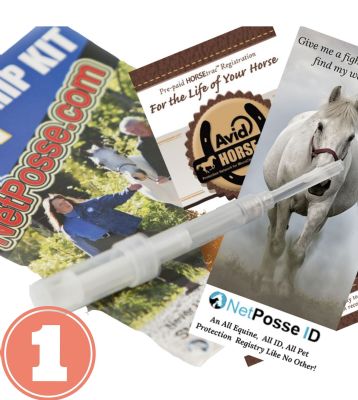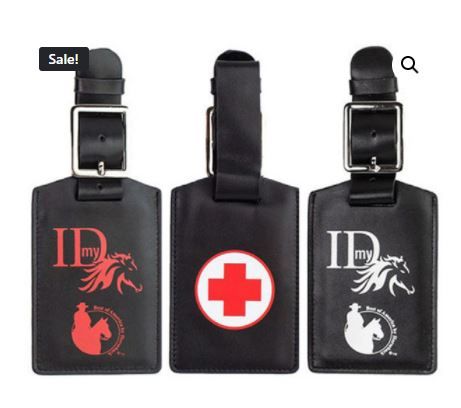Losing a horse on a trail or having one escape is not as uncommon as one may think. There is no set rule on how to search or where to search. Some horses may follow trails, find water sources, and seek out other horses, while others wander throughout the woods. Some hide in the thick brush. We hope you never lose a horse, but if you do, here are some tips to help in your search.
Plan Ahead
Please plan for the worst to happen and hope it never happens. Make sure you identify your horse by age, markings, breed, and permanent ID. When trail riding, place some form of informational contact info on the saddle or bridle that will allow people to find you if they find your horse.
Consider freeze branding and microchipping your horses. Once ID is visible and the other help proves ownership. Products can be purchased to help ID a lost horse for a small investment. You may want to explore some of those possibilities and make a purchase before you go on your next trail ride.
You may want to tie a small cow bell around the neck of the horse before taking off on the trail. Sometimes it is easier to track the sound of the bell than the horse. You can also use a GPS tracker on your horse.
Get Help From Stolen Horse International
Report your horse to the authorities and local search and rescue groups. Report lost horses to Stolen Horse International, a nonprofit organization that operates a nationwide NetPoses Alert system for missing, lost, found, and stolen horses, and where you can create a flyer instantly. Anyone from anywhere can download, print, and post a flyer while you are physically searching for your horse.
File the report at www.netposse.org (or.com). Automatically included with the website report flyer are the following information fields.
- Name of horse
- Color
- Breed
- Height
- Date lost
- Location
- Contact information
- Photos: Pick the best ones for identifying the horse and markings.
- Description of how the horse was lost.
Flyers
Posting the flyer in public places brings many horses home. Don't overlook the importance of getting off the internet and going 'old school' Flyers posted in public give a more comprehensive range of people to see the flyer. One may have already visited your horse or could in the future.
Post the flyers at:
- Trailheads
- Park and parking lot 'community' bulletin boards
- Windshields of all vehicles in the area
- Area restaurants
- Convenience stores (gas stations)
- Anywhere that people may stop in the area.
- Neighbors around the room (by door knobs or mailboxes)
- Leave a flyer with everyone you talk with about your horse. They could see the horse later.
Who Do You Call?
Who do you call if your horse gets lost? When reporting your horse as lost, don't forget to consider surrounding counties, even states, if the state line is close. Here is a quick list in no particular order.
- Local law enforcement
- Park rangers
- Local animal control
- Search and rescue groups
- Trackers with dogs
- Drone pilots (use infrared technology if possible)
- Other campers in the area
- Bike riders
- Hikers
- Dog walkers
- Backcountry Horsemen in the area. They know the local trails.
- Landowners
- Other equestrians
- Construction crews
- Loggers
- Highway workers
- Postal carriers
- C.B. radio operators and truckers are the eyes and ears all over the roads and truck stops.
- Post on social media platforms, NextDoor app (and ones similar), Craigslist
- Helicopter pilots
Ground Search Tips
Make sure you always check back around the area where the horse was lost. Many horses reported to Stolen Horse International, www.netposse.org, have been recovered days, weeks, or even months later near the area where they disappeared. Leave water, food, and hay for the horse if it returns.
When physically searching for the horse:
- Each search team should have a leadline and extra halter.
- Sometimes horses are hung up in thick brush, so they have tools to cut the horse loose.
- Check cell coverage to ensure you have enough bars to call for help. If not, use other types of communication devices.
- Take a flashlight for night searches. Even though you may not intend to be out at night, sometimes that happens.
- Use horses familiar to the lost horse if possible. One horse may nicker to the other and help locate the missing horse.
- Have the search team separate so that the search horses call out to each other.
- Use brightly colored ribbon, clips of cloth, or tags to tie to tree branches to mark the searched areas.
- Mark the manure of the search horses with spray paint or ribbons to show that the waste does not belong to the lost horse.
- Inform searchers of any specific sounds, whistles, etc., that the horse is responsive to at home.
- Search sheds, tight spaces, ponds.
- Take food and water for yourself.
- Dreses for the weather in the area.
- Horses are animals of prey. Keep calm. Read the body language of the horse to make sure it is safe to approach the horse. Approaching them too fast may cause them to run away again.
A horse can cover a great deal of territory. Keep in mind the natural behavior of horses. Some horses may
- Head downhill
- Stay near food sources
- Stay near water
- Respond to the sound of grain shaking in a bucket
Sometimes people find horses but do not know where they belong. In short, they do not get the 'memo' that a horse is lost in their area. Attempts to find an owner by an honest person may result in the horse being transported out of the area to a friend or rescue. Sometimes the wrong type of person finds the horse or ends up with the horse and takes it to a horse auction.
Be familiar with state laws in the area. Estray horses are often sold by the county, and they are found at local auctions in accordance with state estray laws.
This article is brought to you by Stolen Horse International's educational outreach program. If you have any suggestions to add to the article, send an email to us via the CONTACT US tab on the website or by sending a message to our inbox on our Facebook page, Stolen Horse International-NetPosse Missing and Stolen Equine.
Stolen Horse International provides news and other resources for free on this website. As a charitable organization we survive on the kindness of people like you. Please consider donating to help fund the organization or purchasing a NetPosse ID for your horse, dog or cat to help protect your beloved animals!
Debi Metcalfe





